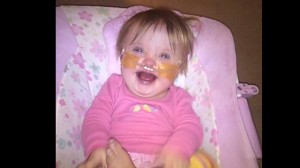No parent should be alone when they find out their child has Down syndrome. But, right now, too many are.
In our case, we were told our daughter had Down syndrome about 2 minutes after she was born. She was still on the warming table, and a neonatal nurse shouted over her shoulder as she left the delivery room:
Doctor, check the baby. I think she has Down syndrome.The OB cleared the room and went over the physical characteristics that caused them to believe Juliet had Down syndrome. My wife’s first question was, “what’s her life expectancy?”
Now, please appreciate that.
For most every parent, the birth of their child is described as the happiest moment of their life. And it certainly was for us. But that lasted for all of 2 minutes and then her mom is wondering if the life she just gave birth to will end in a matter of years.
Once we got to our room at the hospital, a pediatrician visited and talked to us about raising a child with Down syndrome. A geneticist woke us up the following morning to explain that more than likely the extra 21st chromosome that is the cause of Down syndrome came from my wife’s egg–nevermind whether that was relevant or appropriate to share at that time. And, then, upon check out, as I was paying the bill, I was handed a dot-matrix printout that was from some plug-and-chug program that read,
[BABY GIRL] has Down syndromeIt proceeded to list only the associated health conditions.
And. That. Was. It.
That was all the information we received. No pictures of children with Down syndrome living in today’s world. Nothing about social supports, inclusive educational settings, or life experiences of individuals with Down syndrome. Nothing in writing other than that crappy, outdated green-and-white striped, perforated dot-matrix printout.












